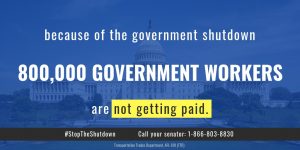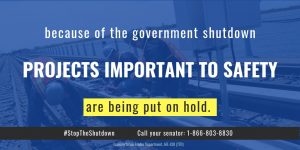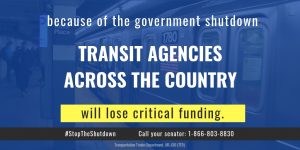Nineteen days. That’s how long 420,000 federal workers have been asked to report for duty without knowing when they will be paid. It’s how long another 380,000 workers have been told not to come to work at all, and face uncertainty about when they will work again. And it’s how long thousands more who work for federal contractors, including custodians, building and construction workers, and administrative professionals, have gone without pay. Worse still, those who work for contractors have little hope of ever recouping what they’re losing and will continue to lose so long as nine federal agencies remain closed.
Follow the hashtag #ShutdownStories on Twitter, and you’ll read about federal workers who face eviction, adoptions that have been put on hold, those with chronic conditions unable to afford medication, and essential employees worried about not being able to show up to work because they don’t have enough money to put gas in their cars.
As heartbreaking as these stories are, it isn’t just hardworking federal employees and their families who face serious challenges right now. Two of the agencies to go unfunded include the Department of Transportation and the Department of Homeland Security, which means across the country, our nation’s transportation network — and the people and businesses who rely on it — face uncertainty.
Just look at our nation’s aviation industry. America’s transportation security officers and air traffic controllers — both of which already face severe staffing shortages — are all working without pay, and the stress is adding up. Also working without pay are 6,700 aviation systems specialists, who support pilots and air traffic controllers by ensuring air traffic and communications equipment is functioning. Meanwhile, many of the federal workers who ensure aviation safety standards are being met, including those who inspect airlines, oversee aircraft manufacturing and maintenance activities, and regulate the use of drones in our airspace, are stuck at home. Without government oversight of this highly complex sector, the aviation industry is left to self-police safety inspections and standards — unsettling news for passengers and crews.
Because nearly all staff at the National Transportation Safety Board (NTSB) are furloughed, the work of the entire agency is stalled. That means everything from the NTSB’s annual Most Wanted List of Safety Improvements to the agency’s investigations into a Florida crash that killed seven and New York limo accident that killed 20 have been put on the sidelines until the shutdown is over.
Those who depend on public transportation are also feeling the effects of this shutdown. A shuttered Federal Transit Agency (FTA) means, regardless of size or geographic location, state and local transit authorities aren’t getting the federal dollars they need to keep their systems fully operational. New York City’s Metropolitan Transit Authority, which shuttles 5.5 million people in any given week, stands to lose $150 million per month in federal funding as long as the government remains closed. Without stable funding, transit agencies may be forced to reduce service, cut maintenance, and furlough workers.
State Departments of Transportation, which also rely on federal funding for major job-creating projects, aren’t faring much better. In Oklahoma alone, the state DOT is putting off three dozen projects totaling almost $133 million because of the shutdown.
Shuttering even part of the federal government is not a game. The men and women who make up this country’s federal workforce — including frontline workers who play a vital role in keeping our transportation system safe and secure — perform important and necessary functions all Americans rely on, whether they realize it or not. Failing to fund nine federal agencies is placing a strain on our economy, jeopardizing the safety and security of our transportation system, and wreaking havoc on real people and real families.
The most tragic part of all is that these problems are preventable and can be fixed. The House passed commonsense legislation to reopen and fund the government last week. It is now up to the Senate to do the same. Transportation labor called on Congress to open the government and will continue putting pressure on lawmakers until federal workers are back on the job. We encourage working families across the country to join this effort by contacting their Senators and telling them to reopen the government.


